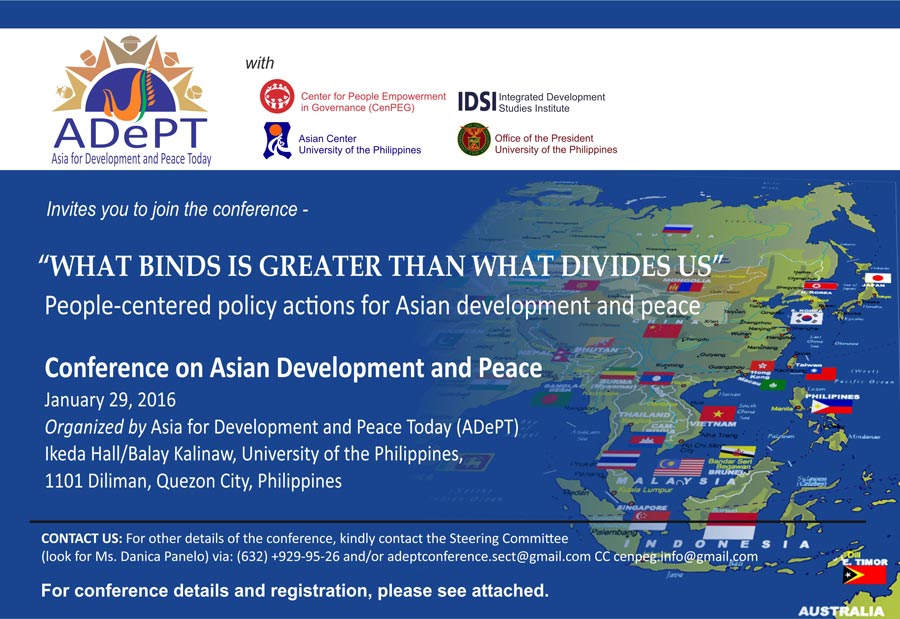
The Asia for Development and Peace Today (ADePT), Fellows of CenPEG and other development & peace advocates and in cooperation with the Integrated Development Studies Institute (IDSI), UP Asian Center, and the Office of the President, University of the Philippines will be holding a conference, "What Binds Is Greater Than What Divides Us: People-Centered Policy Actions for Asian Development and Peace" on 29 January 2016, 9 a.m. - 5 p.m., at the Ikeda Hall/Balay Kalinaw, University of the Philippines Diliman.
Registration • Conference background • Payment method • Accommodations • Contact • Venue • Conference Poster
A new study of the Center for People Empowerment in Governance(CenPEG), “The Opposing Security Architectures of the U.S., Japan, and China in Asia: Implications on ASEAN Countries,” shows Southeast Asian states’ differing positions on the maritime and territorial disputes in the South China Sea (SCS) – part of which is the West Philippine Sea (WPS). Countries in the sub-region seek the development path and find themselves increasingly in types of economic cooperation or interdependence with China. They, however, take divergent positions on settling the maritime and territorial rows with some increasingly aligned – or tilting toward – the major powers in the sub-region, U.S. and Japan on one hand, and China, on the other.
This paradox is taking shape in the larger context of tensions in the East China Sea, the Korean Peninsula, and Taiwan straits on top of extremism, human trafficking, migration, climate change, pandemics, and other “nontraditional” issues. Asia today lies at the center of power politics among major powers including the U.S., Japan, and China.
All these are posing challenges to countries in Southeast Asia to bring into fruition their lofty objective of building a regional community and toward integration. More than just a response by their state governments, what should the peoples of Southeast Asia do to bring about a real regional community and deal with conditions that divide rather than what unite them?
Organized by the Asia for Development and Peace Today (ADePT), Fellows of CenPEG and other development & peace advocates and in cooperation with the Integrated Development Studies Institute (IDSI), UP Asian Center, and the Office of the President, University of the Philippines, the Conference on Asian Development and Peace aims to present people’s perspectives on how to deal with these issues – which are underlined in the CenPEG paper.
Apart from providing the perspectives – particularly socio-cultural, women, migration, maritime, business, and others - the discussion aims to come up with policy solutions and actions to bring the discourse of “oneness” (what
binds rather than what divides Asia) unto the current platform of “regional integration and community.”
Among the topics are:
- “Toward Inclusive Economic Growth in Asia: Philippine Experience” by George T. Siy, IDSI
- “Japanese Perspectives on Development & Peace in Asia: ODA & Alternative People’s Responses” by Prof. Masaki Yokoyama, Ferris University, Japan and
- “Competing Security Architectures in Asia: Impact on ASEAN” by Prof Bobby Tuazon, CenPEG.
Papers and summary of the proceedings will be published. Learn more About Asia for Development and Peace Today (ADePT).
REGISTRATION
Participants are requested to download, fill out and submit a registration form. The registration fee covers conference materials, participation to all sessions, coffee breaks, lunch, as well as morning and afternoon snacks.
- Standard registration: $4.25 / P200.00
- Students/NGOs/congregations (with valid ID): $1.05 / P50.00
Payments can be made on the day of the conference or through the following bank account:
- Account Name: CenPEG Inc
- Dollar Account No. 4254-0201-55
- Peso Account No. 4253-0482-77
- Name of Bank: BPI Phil Heart Center
Proof of payment (deposit receipt) should be presented upon registration at the conference. Receipts will be issued on request and/or upon payment or presentation of deposit receipt.
ACCOMMODATION
Inquiries and transactions relating to lodging facilities may be done directly with the University Hotel, UP Diliman
(www.universityhotel.ph) or with Ikeda Hall / Balay Kalinaw (This email address is being protected from spambots. You need JavaScript enabled to view it.).
CONTACT US
For other details of the conference, kindly contact the Steering Committee (look for Ms. Danica Panelo) via: (02)
+929-95-26 and/or This email address is being protected from spambots. You need JavaScript enabled to view it. cc: This email address is being protected from spambots. You need JavaScript enabled to view it.
Ikeda Hall/Balay Kalinaw is located on Guerrero cor. Dagohoy Streets, University of the Philippines, 1101 Diliman, Quezon City. View the vicinity map.
Registration • Conference background • Payment method • Accommodations • Contact • Venue • Conference Poster
The Asian Center offers M.A. degrees in Asian Studies with four fields of specialization: Northeast Asia, Southeast Asia, South Asia, and West Asia. The Center also has an M.A. program in Philippine Studies that allows students to major in Philippine society and culture, Philippine foreign relations, or Philippine development studies. The Center offers a Ph.D. program in Philippine Studies in conjunction with the College of Arts and Letters and the College of Social Sciences and Philosophy. For an overview of these graduate programs, click here. The Asian Center also publishes Asian Studies: Journal of Critical Perspectives on Asia, the latest issue of which can be downloaded at the journal's website. View recent and upcoming Lectures & Conferences and read other News & Announcements. Join our mailing list to receive invitations to lectures, conferences, etc.

